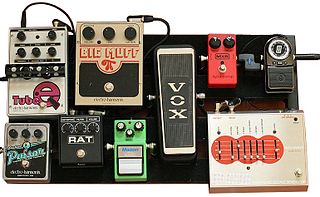
An effects unit, effects processor, or effects pedal is an electronic device that alters the sound of a musical instrument or other audio source through audio signal processing.
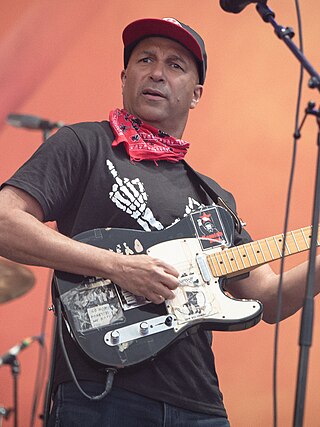
Thomas Baptist Morello is an American guitarist, singer, songwriter, and political activist. He is known for his tenure with the rock bands Rage Against the Machine and Audioslave. Between 2016 and 2019, Morello was a member of the supergroup Prophets of Rage. Morello was also a touring musician with Bruce Springsteen and the E Street Band. Under the moniker the Nightwatchman, Morello released his solo work. Together with Boots Riley, he formed Street Sweeper Social Club. Morello co-founded Axis of Justice, which airs a monthly program on Pacifica Radio station KPFK in Los Angeles.
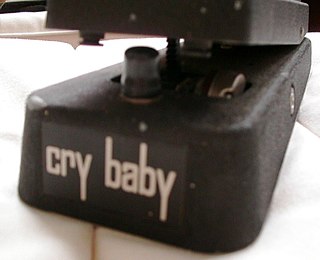
A wah-wah pedal, or simply wah pedal, is a type of effects pedal designed for electric guitar that alters the timbre of the input signal to create a distinctive sound, mimicking the human voice saying the onomatopoeic name "wah-wah". The pedal sweeps a band-pass filter up and down in frequency to create a spectral glide. The wah-wah effect originated in the 1920s, with trumpet or trombone players finding they could produce an expressive crying tone by moving a mute in, and out of the instrument's bell. This was later simulated with electronic circuitry for the electric guitar when the wah-wah pedal was invented. It is controlled by movement of the player's foot on a rocking pedal connected to a potentiometer. Wah-wah effects may be used without moving the treadle as a fixed filter to alter an instrument’s timbre, or to create a "wacka-wacka" funk-styled rhythm for rhythm guitar playing.

A guitar solo is a melodic passage, instrumental section, or entire piece of music, pre-written to be played on a classical, electric, or acoustic guitar. In 20th and 21st century traditional music and popular music such as blues, swing, jazz, jazz fusion, rock and heavy metal, guitar solos often contain virtuoso techniques and varying degrees of improvisation. Guitar solos on classical guitar, which are typically written in musical notation, are also used in classical music forms such as chamber music and concertos.
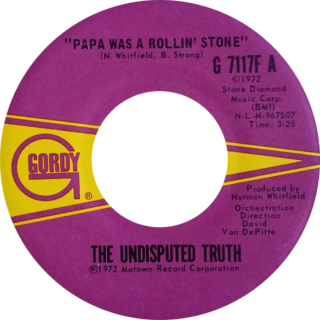
"Papa Was a Rollin' Stone" is a song originally performed by Motown recording act the Undisputed Truth in 1972, though it became much better known after a Grammy-award winning cover by the Temptations was issued later the same year. This latter version of the song became a number-one hit on the Billboard Hot 100.

"Rapture" is a song by American rock band Blondie from their fifth studio album Autoamerican (1980). Written by band members Debbie Harry and Chris Stein, and produced by Mike Chapman, the song was released as the second and final single from Autoamerican on January 12, 1981, by Chrysalis Records. Musically, "Rapture" is a combination of new wave, disco and hip hop with a rap section forming an extended coda.

"Run Like Hell" is a song by English progressive band Pink Floyd, written by David Gilmour and Roger Waters. It appears on the album The Wall. It was released as a single in 1980, reaching #15 in the Canadian singles chart and #18 in Sweden, but it only reached #53 in the U.S. A 12" single of "Run Like Hell," "Don't Leave Me Now" and "Another Brick in the Wall " peaked at #57 on the Disco Top 100 chart in the U.S. To date, it is the last original composition written by both Gilmour and Waters, the last of such under the Pink Floyd banner, and is the last composition ever recorded by all four members of the classic 70s-era Floyd lineup together, within their traditional instrumental roles of Waters on bass, Gilmour on guitars, Nick Mason on drums, and Richard Wright on keyboards, on the same song.
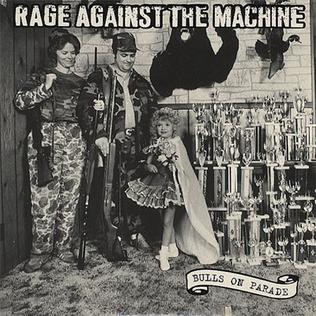
"Bulls on Parade" is a song by American rock band Rage Against the Machine. It is the second song from their second studio album, Evil Empire (1996). It was released as the album's first single to modern rock radio on February 9, 1996.

"Let Me Ride" is a song by American rapper and producer Dr. Dre, released in September 1993 by Death Row, Interscope and Priority as the third and final single from his debut studio album, The Chronic (1992). It experienced moderate success on the charts, until it became a massive hit when Dre won a Grammy Award for Best Rap Solo Performance for the song during the Grammy Awards of 1994. The song features singers Ruben and Jewell, and uncredited vocals by fellow rapper Snoop Dogg
"Know Your Enemy" is a song by American rock band Rage Against the Machine. It features Tool vocalist Maynard James Keenan on vocals during the bridge section, and Jane's Addiction drummer Stephen Perkins playing additional percussion. Allmusic describes the song as "immediately memorable" and "surprisingly straightforward" while music critic Joel McIver cited it as "a standout track" of the album. "Know Your Enemy" had received significant radio airplay by 1993, despite never being released as an official single.

The Dunlop Cry Baby is a popular wah-wah pedal, manufactured by Dunlop Manufacturing, Inc. The name Cry Baby was from the original pedal from which it was copied, the Thomas Organ/Vox Cry Baby wah-wah, first manufactured in 1966. Thomas Organ/Vox failed to register the name as a trademark, leaving it open for Dunlop. More recently, Dunlop manufactured the Vox pedals under licence, although this is no longer the case.

"Calm Like a Bomb" is a song by American rock band Rage Against the Machine from their third album The Battle of Los Angeles. Like their song "Tire Me" from the 1996 album Evil Empire, “Calm Like a Bomb” never had a music video or was released on any media formats. It did, however, receive enough radio airplay to become an album favorite.

"Show Me How to Live" is a song by the American rock supergroup Audioslave. It was released in June 2003 as the third single from their first album, Audioslave, released in 2003. It peaked at number 67 on the Billboard Hot 100 singles chart, number 2 on the Mainstream Rock Tracks and number 4 in the Modern Rock Tracks.

Raymond Lawrence "Boots" Riley is an American film director, producer, screenwriter, rapper, and communist activist. He is the lead vocalist of The Coup and Street Sweeper Social Club. He made his feature-film directorial debut with Sorry to Bother You, which he also wrote.
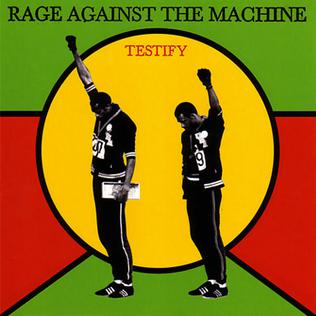
"Testify" is a song by American rock band Rage Against the Machine. It is the opening track from their third album The Battle of Los Angeles (1999), and was released as the third single from the album.

"The Ghost of Tom Joad" is a folk rock song written by Bruce Springsteen. It is the title track to his eleventh studio album, released in 1995. The character Tom Joad, from John Steinbeck's classic 1939 novel The Grapes of Wrath, is mentioned in the title and narrative.

"Original Fire" is a song by American hard rock band Audioslave. It was released in July 2006 as the first single from the album Revelations.

Street Sweeper Social Club is an American rap rock supergroup, formed in Los Angeles, California in 2006. The band primarily consists of guitarist Tom Morello of Rage Against the Machine and vocalist and emcee Boots Riley of the Coup. The band had been testing songs out during Tom Morello's Nightwatchman tour and released an album on June 16, 2009. Stanton Moore drummed for the group for the recording of the album although he did not join the band for the following tour. Street Sweeper Social Club opened for Nine Inch Nails and Jane's Addiction in May 2009. Street Sweeper Social Club describes itself as "more than a band, it's a social club." Their 2010 EP The Ghetto Blaster EP includes covers of M.I.A. "Paper Planes" and LL Cool J's "Mama Said Knock You Out".

Street Sweeper Social Club is the debut self-titled album by American rap rock supergroup Street Sweeper Social Club, composed of guitarist Tom Morello of Rage Against the Machine and Audioslave and rapper/emcee Boots Riley of The Coup. The album was released by Warner Music Group on June 16, 2009.
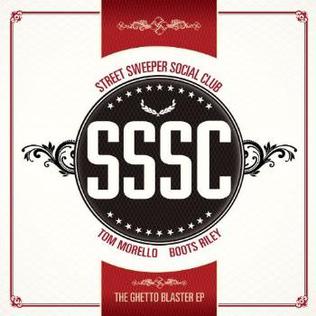
The Ghetto Blaster EP is the first EP from the rap rock supergroup Street Sweeper Social Club, released on August 10, 2010. It features covers of "Paper Planes" by M.I.A. and "Mama Said Knock You Out" by LL Cool J as well as a remix of the band's second single "Promenade." They also cover The Coup song "Everythang". It has also been confirmed that the full touring band has recorded on the album. Tom Morello spoke about the EP in a press release, saying that they shot for an interesting combination of groups. "On The Ghetto Blaster EP we were shooting for a combo of the first Clash record and the Ohio Players greatest hits, interwoven with tractor trailer size riffs of course. This record definitely has more of a 'band' feel than the first, and Boots’ lyrics and delivery have never been sharper." Boots Riley has also said of the EP “We got a new EP that’s going to come out called The Ghetto Blaster EP. [You can expect] hard, hard, hard music and some raw as lyrics on top.”


















